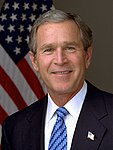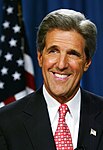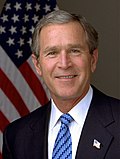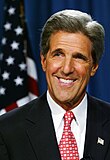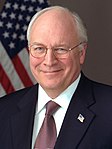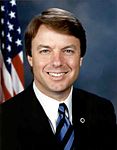
A | B | C | D | E | F | G | H | CH | I | J | K | L | M | N | O | P | Q | R | S | T | U | V | W | X | Y | Z | 0 | 1 | 2 | 3 | 4 | 5 | 6 | 7 | 8 | 9
This article includes a list of general references, but it lacks sufficient corresponding inline citations. (March 2019) |
| |||||||||||||||||
| |||||||||||||||||
The United States presidential election debates were held in the 2004 presidential election. Three debates were held between Republican incumbent George W. Bush and Democratic candidate John Kerry, the major candidates, and one debate was held with their vice presidential running mates, incumbent Dick Cheney and John Edwards. All four debates were sponsored by the non-profit Commission on Presidential Debates (CPD), which has organized presidential debates since its establishment in 1987.
The vice presidential debate was held on October 5 at Case Western Reserve University. The presidential debates were held on September 30 at the University of Miami, October 8 at Washington University in St. Louis, and October 13 at Arizona State University, ahead of the November 2 Election Day. Different moderators and debate formats were used in each debate.
An alternative was proposed by the Citizens' Debate Commission, but was not carried out. There were several third-party candidate debates also held independently from the CPD-sponsored debates. The debates were the latest in a series of presidential debates first held during the 1960 presidential election and held every four years since the 1976 election.
Post-debate polls generally suggested that the 2004 presidential debates were a positive factor for John Kerry's candidacy, as CNN/USA Today/Gallup immediate post-debate polls showed that Kerry clearly won the first and third debates in the eyes of the American television audience, and he tied with Bush in the second. In the follow-up polls taken days after the first two debates, Kerry's perceived positive performance in the debates increased, so that the public then saw Kerry, rather than Bush, as the winner of all three debates.[1]
Participant selection
According to the Commission on Presidential Debates, the predetermined criteria for selecting candidates to participate in its 2004 presidential debates are based on evidence of eligibility as defined in Article Two of the United States Constitution), evidence of ballot access, and evidence of electoral support based on national public opinion polls.
Participants must have appeared on enough state ballots to have at least a mathematical chance of securing the Electoral College majority needed to win the election. While several third-party candidates met the eligibility and ballot access criteria, none had the support of at least 15 percent of the national electorate based on the average of five selected national public opinion polling organizations. The criteria also specified that invitations to the CPD's vice-presidential debate would be extended to the running mates of the candidates participating in the first presidential debate.
Only President George W. Bush and U.S. Senator John Kerry met the CPD selection criteria for any of the presidential debates. As a result, only Vice President Dick Cheney and Senator John Edwards met the criteria for the vice presidential debate.
On October 1, 2004, the Arizona Libertarian Party (AZLP) filed suit against the Commission on Presidential Debates and Arizona State University in the Superior Court of Arizona for Maricopa County regarding the staging of the third presidential debate. They contested that the debate, to be held on the grounds of and partially funded by a state university, constituted an illegal in kind campaign donation because it excluded Michael Badnarik, the Libertarian candidate. (Only Bush, Kerry, and Badnarik had ballot access in Arizona.) In the complaint the Arizona Libertarian Party alleged that ASU was "making a donation to two individual campaigns through the Commission on Presidential Debates as a conduit, in violation of the Arizona Constitution's prohibition on making gifts or donations to individuals or corporations."
Superior Court Judge F. Pendleton Gaines III issued an order to show cause for the president of ASU and for the director of the CPD to appear in court for a hearing on October 12, a day before the scheduled debate. Gaines denied a restraining order on the grounds of laches and that there was a sufficient public purpose for the debate, but also ruled that the AZLP could continue to pursue damages for any violations to their constitutional rights.
The Arizona debate nonetheless proceeded on October 13.
On October 8, at the second debate at Washington University in St. Louis, Badnarik and another third-party nominee, Green candidate David Cobb, were arrested in a civil disobedience action after crossing a police line outside the debate venue to protest their exclusion from the debate. Badnarik said he was attempting to serve the order to show cause; both candidates were released after being ticketed for trespassing and refusing a reasonable order from a policeman.[2][3][4]
Presidential debates memorandum of understanding
A memorandum of understanding (MOU) between the Bush 2004 campaign and the Kerry 2004 campaign, covering in minute detail all aspects of the presidential candidate debates held between the two candidates was created. It was 32 pages long and dated September 20, 2004.
The Citizens' Debate Commission (CDC) and others were instrumental in getting the campaigns to publish the MOU in advance of the debates. One of the commissioners of the CDC, George Farah, has written about the earlier debate MOUs in the 2004 tome No Debate: How the Republican and Democratic Parties Secretly Control the Presidential Debates.[5]
Debate schedule
| 2004 United States presidential election debates | ||||||||||||||||
|---|---|---|---|---|---|---|---|---|---|---|---|---|---|---|---|---|
| No. | Date & Time | Host | Location | Moderator | Participants | |||||||||||
| Key: P Participant. N Non-invitee. |
Republican | Democratic | ||||||||||||||
| President George W. Bush of Texas |
Senator John Kerry of Massachusetts | |||||||||||||||
| 1 | Thursday, September 30, 2004,
9:00 – 10:30 p.m. EDT[6] |
University of Miami | Coral Gables, Florida | Jim Lehrer of PBS | P | P | ||||||||||
| 2 | Friday, October 8, 2004,
9:00 – 10:30 p.m. EDT[6] |
Washington University in St. Louis | St. Louis, Missouri | Charles Gibson of ABC | P | P | ||||||||||
| 3 | Wednesday, October 13, 2004,
9:00 – 10:30 p.m. EDT[6] |
Arizona State University | Tempe, Arizona | Bob Schieffer of CBS | P | P | ||||||||||
| 2004 United States vice presidential debate | ||||||||||||||||
| No. | Date & Time | Host | Location | Moderator | Participants | |||||||||||
| Key: P Participant. N Non-invitee. |
Republican | Democratic | ||||||||||||||
| Vice President Dick Cheney of Wyoming |
Senator John Edwards of North Carolina | |||||||||||||||
| VP | Tuesday, October 5, 2004,
9:00 – 10:30 p.m. EDT[6] |
Case Western Reserve University | Cleveland, Ohio | Gwen Ifill of PBS | P | P | ||||||||||
Originally, the CPD specified that the first debate would be focused on domestic policy and the third focused on foreign policy. Those terms were changed in an announcement by the CPD on September 24, after it had reviewed the terms of the MOU. The CPD agreed that foreign affairs and homeland security would be the primary topic for the first debate and domestic and economic policy will be the primary topic of the third debate. More broadly, it also agreed to make a "good faith effort" to accommodate the rest of the terms of the MOU.
The September 24 announcement, which was released in the format of a copy of a letter sent to the two campaigns, also noted CPD's pleasure at the willingness of the two campaigns to participate in the second, "town meeting"-style debate, yet was ambiguous about just what had been agreed to.
Originally, the CPD had announced that questions for the second debate would come from undecided voters selected by the Gallup Organization from the standard metropolitan statistical area surrounding the host city. This had been the policy followed for the 1992, 1996, and 2000 debates. But the September 24 letter to the two candidates did not comment on this; instead, it noted that campaign representatives can discuss participant selection methodology with Dr. Frank Newport of Gallup in order to resolve any open issues. One such issue was that the MOU specified that half the questions be asked by "soft Kerry supporters" and half by "soft Bush supporters," though what is meant by those terms was not made clear.
Format
For 2004, each debate lasted ninety minutes, included a live audience, had no opening statements, could have included follow-up questions from the moderator and ended with closing statements of two minutes.
September 30: First presidential debate (University of Miami)
| First presidential debate | |
|---|---|
| Date(s) | September 30, 2004 |
| Venue | University of Miami |
| Location | Coral Gables, Florida |
| Participants | George W. Bush John Kerry |
| Footage | PBS |
| Moderator(s) | Jim Lehrer of PBS |
The debate was held in the Convocation Center of the University of Miami in Coral Gables, Florida.
Jim Lehrer of PBS' The NewsHour posed nine questions for each candidate.
Video stream
- RealPlayer video stream of the debate from the BBC website
- Video and stream of the debate from the Internet Archive
Post-debate poll
62.5 million people tuned into the debates, an increase of just over 35 percent from 2000.
Controversies
Bush's suit bulge
A bulge in the back of Bush's suit jacket during this debate triggered rumors that he was "wired" with a radio receiver, presumably to receive instructions from his strategists.[7] Contributing to the rumors was the perception that, at one point, Bush stated "Let me finish" in response to no apparent interruption and when he still had time on the clock, and some long pauses by Bush before he began answering a question. Others dismissed these accusations, saying that the "Let me finish" was a response to a gesture that Lehrer made, and the pauses were a result of Bush gathering his thoughts before responding.
White House officials initially claimed that the bulge was a "wrinkle in the fabric," and that Bush was not wearing a bullet-proof vest, as many conjectured. Bush's tailor later said that the bulge was nothing more than a pucker along the jacket's back seam, according to The Seattle Times. After the election, unidentified sources in the Secret Service told The Hill that Bush was wearing a bullet-proof vest and that campaign handlers had not admitted it earlier for security reasons.[8]
In 2020, NBC News referred to the 2004 microphone earpiece allegations as a "conspiracy theory" and likened the allegations to unfounded right-wing claims that Hillary Clinton wore a microphone in a 2016 debate, or that Joe Biden wore an earpiece in a 2020 debate.[9]
"You forgot Poland"
During the debate John Kerry accused Bush of having failed to gain international support for the 2003 invasion of Iraq, saying "... when we went in, there were three countries: Great Britain, Australia and the United States. That's not a grand coalition. We can do better." Bush, who had used Poland earlier in the debate as an example of the international presence in Iraq, replied by saying "Well, actually, he forgot Poland. And now there's 30 nations involved, standing side by side with our American troops."[10] Paraphrased as "You forgot Poland", the term became a popular catchphrase among Bush detractors, who saw it as a humorously petty rebuttal of Kerry's original point.
Bush facial expressions
During the debate, Bush made facial expressions which were later described as negative. Democrats highlighted these facial expressions after the debate, claiming that Bush was annoyed during the debate.[11]
October 5: Vice presidential debate (Case Western Reserve University)
| Vice presidential debate | |
|---|---|
| Date(s) | October 5, 2004 |
| Venue | Case Western Reserve University |
| Location | Cleveland, Ohio |
| Participants | Dick Cheney John Edwards |
| Footage | PBS |
| Moderator(s) | Gwen Ifill of PBS |

